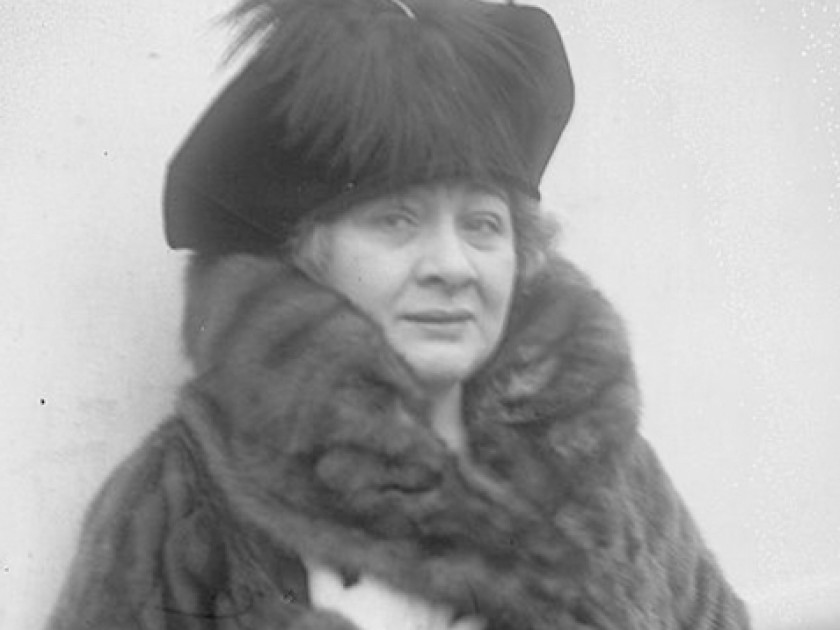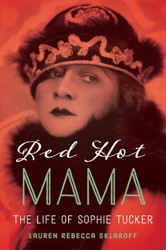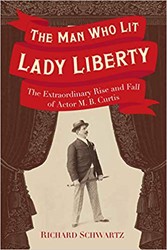
Sophie Tucker, 1900. Bain News Service / Wikimedia Commons
I had never heard of Sophie Tucker before 2010. While redesigning a course I teach on American Popular Culture, I stumbled upon a YouTube montage of photos of the flashy, smiling Tucker. In the background played her signature ballad, “Some of These Days.” She made her way into my course as an example of a vaudeville headliner, accompanying Fanny Brice, Eva Tanguay, Al Jolson, and others.
I had just published my first book, Black Culture and The New Deal: The Quest for Civil Rights in the Roosevelt Era, and was looking for another story to tell about outsiders who achieve power in untraditional ways.
I have always been interested in people who put on disguise and cross boundaries, especially when it comes to racial identity. So, when I discovered that Sophie Tucker began her career in blackface, I was intrigued. Like her contemporaries, Al Jolson, Eddie Cantor, and Fanny Brice — all who used blackface during their careers — Tucker entered the entertainment business as someone other than herself. But was this enough to warrant a full-length biography? I waffled on this predicament while I searched for materials about the performer, finding records and video clips — superficial accounts of Tucker’s entertainment engagements — reaffirming my thoughts that she was perhaps “just a singer.” The study of American culture has never been considered as “serious” as political or social history in the minds of academics, and I certainly didn’t want to further that conception.
Still, I stared at the image on my computer screen of Tucker at her 1953 Golden Jubilee. Dripping in diamonds, her blonde, shiny hair piled on her head, she was celebrating fifty years in show business. Tucker was clearly loved by the public, and I had to know why.
One of the ironies of writing history is that sometimes subjects with the richest records receive the least amount of public attention. Once I committed myself to full-scale detective work, I learned that Tucker had left hundreds of her personal scrapbooks to the New York Public Library and Brandeis University. The sheer volume of them was daunting, and when I asked other scholars who would have been likely Tucker biographers, the consensus was that they were just full of ephemera. (I heard about pages of greeting cards.) Still, I had to see them for myself.
The scrapbooks were unwieldy. They were jam-packed with articles, business cards, playbills, letters, and yes, greeting cards, all which Tucker began to collect when she started her career in 1907. The materials were literally falling into my lap; scattered pieces of articles, 100 years old, revealed their fragility. Just when I felt I had sufficient materials to understand one aspect of Tucker’s life, more carts with more scrapbooks came to greet me, unsettling my confidence. It wasn’t possible to grasp everything.
Almost sixty years of experiences were on these pages. By the time Tucker became a headliner in the 1910s, she was performing twice a day, every day, and she put all reviews, personal interactions, and programs in the scrapbooks. Eventually, she had to hire several people to manage the books, but she was as dedicated to them as she was to her repertoire. For her, the record and legacy of her stardom was as important as anything she was doing in her career. Fortunately for me, it became the basis not only for a biography of Sophie Tucker, but a larger understanding of all the mediums — vaudeville, film, radio, cabarets, Broadway, television — that she inhabited and influenced.
It turns out that she was, above all, a performer — but I was flawed in my initial thinking. She shaped the world around her, and did matter as a “serious” subject. Among her many accomplishments, she was the first female president of the American Federation of Actors, a champion for African Americans in show business, and one of the most influential philanthropists on behalf of Jews. Her acclaim was matched in Britain where she performed for decades, with three command performances for royalty. The scrapbooks not only contained correspondence from fans and show business friends like Irving Berlin and Ed Sullivan, but also from Albert Einstein, Dwight Eisenhower, and Golda Meir. She turned out to be just what I had hoped to find, an outsider — Jewish, overweight, outspoken — who became the ultimate entertainment insider.
Did I get to know the “real” Sophie Tucker? I’m not sure. I know the version she wanted people to see, and I know that the guilt she felt for abandoning her only son influenced many of her decisions. That is why the scrapbooks exist — proof that fame was a justification for living without a family. They are also proof that even though she couldn’t be part of her own family for years, she created alternative kinships — with African Americans, with other assimilated Jews, and with women who cast aside convention. Tucker’s world allowed for her success because she was an unlikely celebrity. Mama to all and mother to none, her story was worth telling.
A leading scholar of American cultural history, Lauren Rebecca Sklaroff is an associate professor of history at the University of South Carolina. She is the author of Black Culture and the New Deal: The Quest for Civil Rights in the Roosevelt Era and the recipient of an NEH public scholars fellowship.



